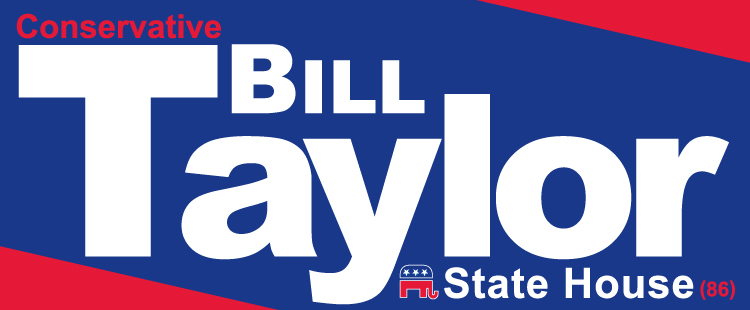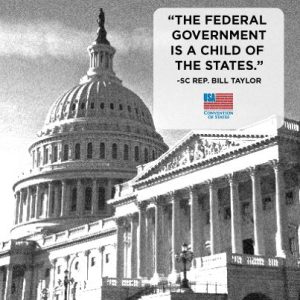Dear Friends,
The federal government shutdown will hit more than 550,000 South Carolinians with a gut punch starting this weekend. The political dysfunction on Capitol Hill has led to the suspension of the SNAP program because it has run out of money. Those reliant on food stamps will not receive benefits for November or until the government reopens. The U.S. Department of Agriculture, which administers SNAP benefits, states that “the well has run dry.”
SC Neighbors Helping Neighbors
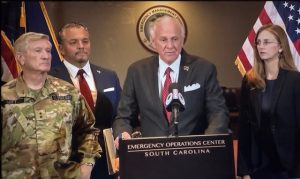 Gov. Henry McMaster has called on South Carolinians to help neighbors in every way possible. During a briefing at the state’s Emergency Management Headquarters, he activated the One SC Fund to provide emergency support to food banks and pantries across the state. Those food banks are already facing critical shortages and can only fill a fraction of the gap left by SNAP suspension. The Governor called for extraordinary public and corporate donations to meet urgent needs.
Gov. Henry McMaster has called on South Carolinians to help neighbors in every way possible. During a briefing at the state’s Emergency Management Headquarters, he activated the One SC Fund to provide emergency support to food banks and pantries across the state. Those food banks are already facing critical shortages and can only fill a fraction of the gap left by SNAP suspension. The Governor called for extraordinary public and corporate donations to meet urgent needs.
The One SC Fund, established in 2015, coordinates disaster philanthropic response in South Carolina. The fund was activated for hurricanes Matthew, Florence, and Helene, as well as during the COVID-19 pandemic. 99% of donations will go directly to the four central food banks and the 900 pantries in all 46 counties. Locally, Golden Harvest serves Aiken and five other surrounding counties. These food banks are funded solely by donations; they don’t receive government funding.
Food insecurity has increased up to 30% in some areas; 1 in 7 people and 1 in 5 children in South Carolina are food insecure. 48% of SNAP households have children. Hardest hit will be children, the elderly, and the disabled.
State Funding
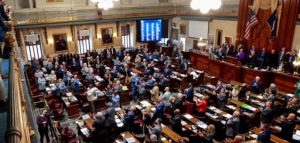 There are no state funds available for food. States rely solely on the federal SNAP program to address food insecurity. Gov. McMaster says he cannot unilaterally declare an emergency to release food aid because the General Assembly must appropriate funds. The legislature would need to call itself back into session, then debate and vote on extraordinary funding to offset the loss of SNAP benefits. That is not a quick process, and politics makes the outcome uncertain. Of course, the quickest and easiest solution would be for the Democrats in the U.S. Senate to vote for the Continuing Resolution to reopen the government and fund SNAP and other vital programs.
There are no state funds available for food. States rely solely on the federal SNAP program to address food insecurity. Gov. McMaster says he cannot unilaterally declare an emergency to release food aid because the General Assembly must appropriate funds. The legislature would need to call itself back into session, then debate and vote on extraordinary funding to offset the loss of SNAP benefits. That is not a quick process, and politics makes the outcome uncertain. Of course, the quickest and easiest solution would be for the Democrats in the U.S. Senate to vote for the Continuing Resolution to reopen the government and fund SNAP and other vital programs.
Urgent Need for Donations
 Currently, the food banks are critically low on food supplies, with more than half a million South Carolinians expected to need food assistance within a week. Worse, it takes 2–3 weeks to restock their warehouses.
Currently, the food banks are critically low on food supplies, with more than half a million South Carolinians expected to need food assistance within a week. Worse, it takes 2–3 weeks to restock their warehouses.
Private support is vital, but can’t match the scale of the federal nutrition program, which distributes $110 million monthly in SC. The One SC Fund raised over $6 million during Hurricane Helene. Much more money is urgently needed to help those in need of food assistance. If you are able to contribute, please do so.
Additionally, there are opportunities for churches, houses of worship, and civic organizations to step forward with help in every way possible. Also, individuals are needed to help food banks and pantries with the monumental task of caring for our neighbors. We’re ONE SC – let’s Stand Together @ One SC Fund.
MY COLUMN IN TODAY’S AIKEN STANDARD
Washington is Paralyzed. The States Must Step In.
Washington is paralyzed. The latest government shutdown is only the most visible symptom of a deeper dysfunction: a Congress locked in endless partisan warfare, unable to perform even the most basic responsibility — keeping the government open. Senators can’t even agree on a temporary continuing resolution — the same stopgap measure they passed 13 times in recent years, most recently in March.
Dysfunctional Congress
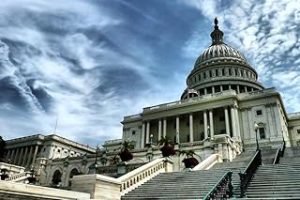 For decades, Congress has been sliding toward dysfunction. Americans send lawmakers to Washington to represent them, not to score political points or serve narrow interests. Not every senator or representative is a partisan warrior. Some genuinely want to craft sound policy. But too often, the loudest and most extreme voices drown out sensible leadership.
For decades, Congress has been sliding toward dysfunction. Americans send lawmakers to Washington to represent them, not to score political points or serve narrow interests. Not every senator or representative is a partisan warrior. Some genuinely want to craft sound policy. But too often, the loudest and most extreme voices drown out sensible leadership.
This dysfunction has consequences. Congress has effectively surrendered its lawmaking authority, leaving a vacuum filled by executive orders — no matter which party occupies the White House. That is why every presidential election now feels like doomsday.
Meanwhile, public trust in Congress has collapsed. Polling shows more than 70 percent of Americans view Congress unfavorably; at times, that figure has topped 80 percent. Most Americans want government to work, keep them safe, and stay out of their private lives. Washington is failing on all counts.
Fiscal Folly and Federal Overreach
 We have watched the same cycle of fiscal irresponsibility repeat itself: bloated omnibus spending bills, expanding entitlements, mounting deficits, and gimmicks to avoid tough choices. Our national debt has now soared past $38 trillion. These reckless decisions will burden generations not yet born.
We have watched the same cycle of fiscal irresponsibility repeat itself: bloated omnibus spending bills, expanding entitlements, mounting deficits, and gimmicks to avoid tough choices. Our national debt has now soared past $38 trillion. These reckless decisions will burden generations not yet born.
Worse, the federal government increasingly behaves as though its powers are unlimited. That is the opposite of the design of our constitutional republic, where federal authority was meant to be “few and defined” and state powers “numerous and indefinite,” as James Madison wrote in Federalist 45.
Time for a Structural Reset
Chief Justice John Roberts has observed: “The States are separate and independent sovereigns. Sometimes they have to act like it.” That time has come.
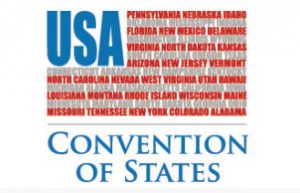 The Framers of the Constitution gave the states a tool to rein in Washington when it grew too large and unaccountable: Article V. This provision outlines two methods for amending the Constitution. Congress may propose amendments with a two-thirds vote in both chambers, or—if two-thirds of state legislatures apply—Congress must call a convention of states to propose amendments. Any proposal must still be ratified by three-quarters of the states, an intentionally high bar.
The Framers of the Constitution gave the states a tool to rein in Washington when it grew too large and unaccountable: Article V. This provision outlines two methods for amending the Constitution. Congress may propose amendments with a two-thirds vote in both chambers, or—if two-thirds of state legislatures apply—Congress must call a convention of states to propose amendments. Any proposal must still be ratified by three-quarters of the states, an intentionally high bar.
The logic is simple: Congress will never limit its own power. When Washington drifts too far, the states must act.
What Reform Could Look Like
Imagine constitutional amendments requiring a balanced federal budget, or at least meaningful restraints on deficit spending. Picture term limits for members of Congress and federal judges, clearer boundaries on executive authority, and a reaffirmation of the Tenth Amendment’s promise that powers not delegated to the federal government are reserved to the states and the people.
These are not radical ideas. They are common-sense reforms, entirely consistent with the vision of the Founders.
South Carolina is All In
 In 2022, South Carolina became the 19th state to pass a resolution calling for a Convention of States. I was proud to sponsor that resolution. After nine years of effort, it was finally approved. We now need 15 more states to reach the constitutional threshold.
In 2022, South Carolina became the 19th state to pass a resolution calling for a Convention of States. I was proud to sponsor that resolution. After nine years of effort, it was finally approved. We now need 15 more states to reach the constitutional threshold.
Critics warn of a so-called “runaway convention.” That is nonsense. South Carolina and other states have passed limited-purpose applications, confining the scope to fiscal restraints, term limits, and limits on federal jurisdiction.
To ensure accountability, the South Carolina House this year passed legislation I proposed that establishes the process and requirements for selecting commissioners and requires the Attorney General to prosecute a commissioner for misconduct in office if they violate their oath. The bill is pending in the Senate.
Momentum is Growing
Several weeks ago, I was in Salt Lake City meeting with a bipartisan group of legislators from 14 states. It was the National Legislative Federalism Summit. We focused on strategies to rebalance the intended “partnership” between states and the federal government.
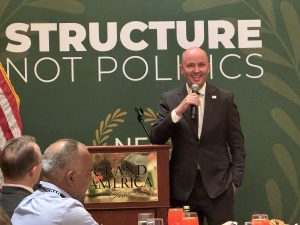 Utah Gov. Spencer Cox kicked off this first-ever summit by saying, “This might be the most important meeting being held in America today, and that’s not hyperbole.”
Utah Gov. Spencer Cox kicked off this first-ever summit by saying, “This might be the most important meeting being held in America today, and that’s not hyperbole.”
He spoke of the urgency to rebalance the division of power between the states and Washington, and to return to our Founders’ intent, as written into the Constitution — a federal government with defined and limited powers. In contrast, all other powers belong to the sovereign states.
Gov. Cox said, “Our nation’s Founders knew that centralized power was dangerous and that absolute power corrupts. That’s why our Founders established the concept of dual sovereignty with checks and balances, particularly between the states and the federal government. The division of power between the federal government and states has significantly eroded.
A week earlier, I was in Indianapolis, invited to speak at the Convention of States Race to Freedom Leadership Summit. It was an honor to be shoulder-to-shoulder with citizen patriots working mightily in every state to rein in our bloated federal government. I was asked to provide advice to these national grassroots leaders on how best to engage with legislators.
Following the CoS summit, Just the News posted an article titled “Convention of States effort surges as Trump aims at shrinking size, scope of federal government.” It’s a great piece that discusses the summit and hammered home that if President Trump wants to protect his legacy as a swamp-drainer, he should throw his weight behind the Convention of States. A few hours later, President Trump reposted the article on his own personal Truth Social page. We have his attention.
Restoring the Republic
The Convention of States is not a cure-all, and it is not in rebellion. It is a constitutional and meaningful mechanism for restoring balance. It elevates the states, reaffirms federalism, and forces Washington to operate within its limits.
The Founders foresaw this moment. They gave the states the authority to act when Washington would not. Now, with dysfunction on full display and the debt clock spinning ever higher, the states must answer that call.
The hour is late. But the path forward is clear. If the Republic is to be preserved, the states—not Washington—must lead the way.

